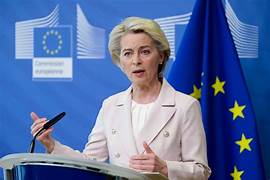In the intricate world of European Union politics, Ursula von der Leyen faces a daunting challenge: to secure her reelection as President of the European Commission. The process involves both the European Council and the European Parliament. Ursula von der Leyen’s center-right European People’s Party (EPP) boasts significant support among EU heads of state, but concerns linger about potential dissent within her party and among other political groups. Furthermore, alliances forged with groups like Renew Europe and the Socialists and Democrats may not guarantee the necessary votes, as ideological divisions and strategic considerations will come into play. The upcoming election turnout is poised to be intriguing and significant; it will be interesting to see how things unfold in Europe.
Von der Leyen’s path to re-election relies heavily on two pivotal milestones. Firstly, she needs to garner the backing of a majority of EU leaders in a crucial meeting after the election. While this may seem straightforward, it represents only one aspect of her broader challenge.
Conveniently, her center-right European People’s Party (EPP) holds significant sway within the European Council, which could work in her favor. However, uncertainties loom large on the horizon, particularly regarding the possibility of opposition from leaders such as Emmanuel Macron and Olaf Scholz. Yet, the most formidable hurdle lies in amassing support within the European Parliament.
While Von der Leyen’s EPP is expected to emerge as the largest parliamentary group. Von der Leyen’s EPP (European People’s Party) holds a pivotal position in European politics. As a center-right political group, it commands significant influence within the European Council and the European Parliament. With support from numerous heads of state and government, the EPP serves as a stronghold for Von der Leyen’s re-election bid. However, its dominance is not without challenges, as dissent and opposition from within its ranks remain potential hurdles, securing a majority entails delicate negotiations with other centrist factions. These negotiations are complex, typically revolving around job assignments and political roles.
However, the transition from support projections to tangible support presents its own set of challenges. Dissent is a looming presence within the party ranks, extending even to the EPP itself, where rebellion rates could potentially be alarmingly high.
In her previous confirmation bid, Von der Leyen secured victory by a narrow margin. However, maintaining the backing of her former allies poses a challenge, particularly as socialists and liberals have expressed apprehensions regarding her policies. These concerns stem from differing perspectives on critical matters like social welfare, environmental protection, and economic policies. Specifically, there are worries that Von der Leyen will be compromising the European Union’s green agenda, a priority for many socialist and liberal MEPs. They are poised to oppose her if they perceive a lack of dedication to their ambitious environmental initiatives. Such reservations underscore the importance of addressing divergent policy viewpoints to ensure broad support.
Some EPP members, including Les Républicains, have already expressed opposition to Von der Leyen’s re-election. To secure sufficient support, she needs to engage in extensive lobbying efforts, carefully navigating potential alliances. Her approach to Meloni’s European Conservatives and Reformists (ECR) is already delicate, as any association with them could risk alienating socialist and liberal factions further. Thus, Von der Leyen faces the arduous task of balancing outreach efforts while ensuring that her political alignments do not compromise her broader support base. This intricate dance underscores the complexity of coalition-building in the European political landscape.
Without the backing of the ECR, Von der Leyen’s dependence on Renew, S&D, and Greens becomes increasingly significant. However, obtaining their support will necessitate making concessions, potentially leading to conflicts with conservative interests. Additionally, the urgency of time constraints further heightens the pressure on Von der Leyen. With a demanding schedule for negotiations and confirmation, she needs to navigate swiftly and efficiently through the complex landscape of European politics. This entails engaging in extensive dialogue, making strategic decisions, and seeking compromises while striving to secure the broad-based support necessary for her re-election bid.
This delicate balancing act highlights the intricate nature of coalition-building in the European political arena, where competing priorities and divergent ideologies must be carefully navigated to secure the necessary backing for re-election. Thus, Von der Leyen faces the challenge of managing diverging demands while seeking to maintain a broad support base across the political spectrum.








